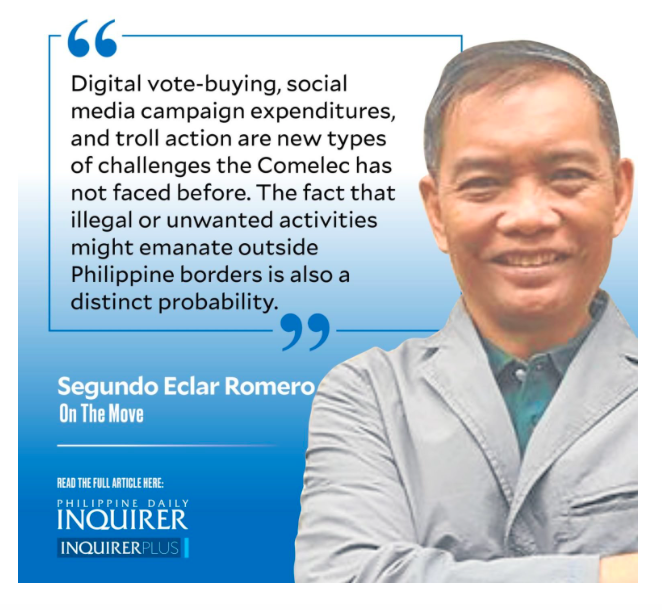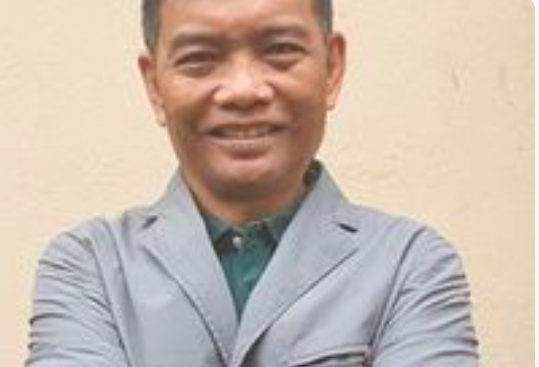
There they go!
Sen. Panfilo Lacson, Sen. Emmanuel Pacquiao, Mayor Francisco Moreno, former senator Ferdinand Marcos Jr., and Vice President Leni Robredo are all racing for the presidency in May 2022.
All eyes are on the candidates and their campaigns. But looking at the runners making their way on the track is looking too narrowly. Who wins may depend on factors outside their electoral performance.
The biggest of them is “digital vote-buying.” Commission on Elections spokesperson James Jimenez said the Comelec has worried about the possibility of electronic payments like GCash being used to buy votes in the coming elections. The COVID-19 pandemic not only has familiarized Filipinos with the practice of sending and receiving money electronically, it has also given them the occasion to use it to tap their social safety nets during the debilitating pandemic.
Jimenez tells us the poll body is not capable of singlehandedly preventing digital vote-buying. Several government agencies need to work together to counter this threat that can lead to questionable electoral results. One problem, according to Commissioner Rowena Guanzon, is that the Comelec has not done this kind of tracing and prevention of digital vote-buying before. There are no systems established for dealing with this novel threat to fair and honest elections.
Guanzon was told the Bangko Sentral ng Pilipinas (BSP) will be able to trace the use of digital vote-buying. But tracing after the fact might not be enough. What is needed is setting up the system and demonstrating the capability to dissuade attempts at massive digital vote-buying. After-the-fact forensic investigations that prove digital vote-buying happened after the candidate of interest has been proclaimed might be too late.
Philippine National Police chief Gen. Guillermo Eleazar worries about the limited information electronic payment platforms may be willing to share in the interest of client privacy. They may also be unwilling to store and preserve massive data for the authorities. Eleazar thinks the challenge of digital vote-buying requires vigilant citizen reporting.
Section 261 of the Omnibus Election Code punishes vote-buying and vote-selling with imprisonment, disqualification from office, deprivation of the right to vote, and fines. However, digital vote-buying is a new practice; processes for its regulation, investigation, prosecution, and jurisprudence do not yet exist.
The second most worrisome problem is the undue advantage that might result from the use of ads on Facebook and other social media platforms. Jimenez said the Comelec will tap Facebook for data on dedicated campaign advertisements of political candidates. However, the numerous social media platforms and the different ways in which information is communicated and shared would be challenging to monitor. Even if real-time monitoring is possible, final tracking can only happen when the campaign period has been completed. An effective system of countermeasures needs to be set up beforehand. For this, the Comelec is shorthanded and underfunded. Perhaps the biggest problem of all might be the absence of laws that regulate the use of social media during campaign periods.
The Comelec has the distinction of undertaking the biggest project in government, that of bringing out 61 million voters on election day, record and canvass their votes, and proclaim the winners. It takes slightly longer to proclaim the national candidates, but this is amazing work. Comelec field officers have the gung-ho attitude of being creative, of being troubleshooters so the elections will happen without a hitch despite problems in schedules, logistics, communications, machines, and other challenges. But they deliver each time.
Digital vote-buying, social media campaign expenditures, and troll action are new types of challenges the Comelec has not faced before. The fact that illegal or unwanted activities might emanate outside Philippine borders is also a distinct probability. The Comelec and concerned agencies like the PNP, the National Bureau of Investigation, the BSP, the Department of Information and Communications Technology, the electronic payment firms, the citizen arms of the Comelec, ICT-expert organizations, and international electoral integrity organizations need to work to set up the countermeasures before the election campaign gets going. This country needs clean and fair elections in May 2022. We owe this to the candidates running for elections in May 2022, all their supporters, as well as the Filipino citizenry that is hoping for a new beginning and national renewal after more than two years of the COVID-19 pandemic. Time to get going!
—————
doyromero@gmail.com


